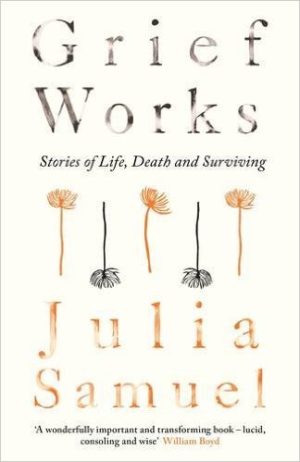I confess to approaching this book with trepidation. Bereavement will happen to all of us, some more tragically than others, but it is still the kind of bad news that most people would rather not read about. In the event, I was wrong to worry. Renowned grief psychotherapist Julia Samuel has 25 years of experience and you can tell. It’s almost as if you can feel her presence in this book. She’s compassionate, interested and non-judgemental and writes about death and mourning with a comforting yet pragmatic voice.
‘The paradox of grief is that finding a way to live with the pain is what enables us to heal’ Samuel writes, hence her paradoxically uplifting title Grief Works. Samuel takes us through cases from her long career, examples of people losing a partner, a parent, a child, a sibling and facing their own death. Every chapter has a section with specific, practical advice.
The book shows us how different people react to bereavement, some by throwing all their energy into their mourning, some by becoming paralysed with grief. Some with the approach ‘Least said, soonest mended’, others unable to talk about anything else. Samuel listens and never judges. What works for one might not work for others.
Grief is essentially a lonely process, Samuel writes, that requires patient listeners and time. She doesn’t believe in closure, and argues that loss will always stay with us, but will, with time, be encapsulated by our everyday lives.
This book might give you a deeper understanding of your own mourning and will, for sure, leave you full of admiration for people working through grief. And, as the author concludes: ‘As someone who has been brave enough to read this book, you have, I hope, found these stories inspiring and replaced your fear with confidence….’. Because, ‘…when we avoid confronting death, we imbue it with more power to frighten us.’
Grief Works is published by Penguin Life, 255 pages.
There are other excellent books on grief out there, some of our favourites are Max Porter’s Grief is the Thing With Feathers and (for children) Michael Rosen’s Sad Book. Other books touching on death and loss worth reading are Atul Gawande’s Being Mortal and Henry Marsh’s Do No Harm.
Fans of therapist Stephen Grosz’s The Examined Life will find in Samuel an author with similar wisdom and compassion.





